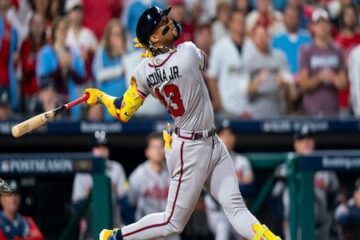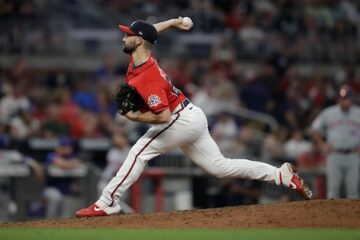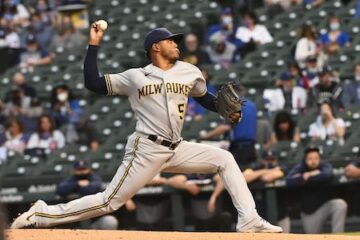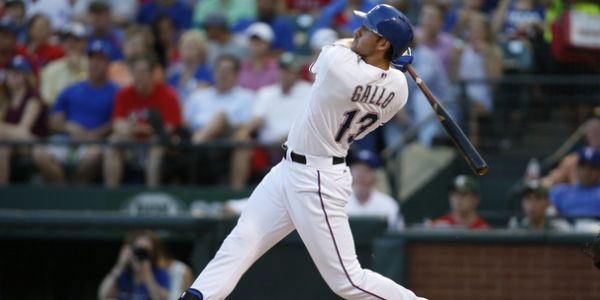What the Justin Upton Trade Can Teach Us About Fantasy Baseball Strategy
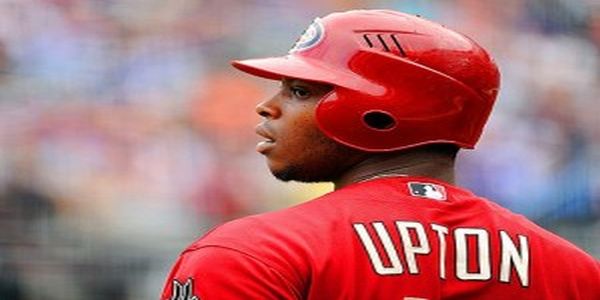
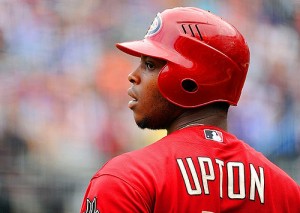
While the Arizona Diamondbacks’ trade of Justin Upton to the Atlanta Braves for Martin Prado and a grab bag of prospects won’t have a ton of fantasy impact for the players involved, it can teach us a worthwhile lesson about fantasy baseball strategy.
The lesson: In baseball, there’s no such thing as absolute value.
ESPN’s Keith Law trashed Arizona GM Kevin Towers for getting less than fair market value for his budding superstar. That’s just one man’s opinion, your personal evaluation of Randall Delgado, Nick Ahmed and the like may vary, but it’s hard to argue with Law’s general diagnosis. Towers overplayed his hand.
Every team in MLB knew that he wanted to move Upton. On its own, that’s not necessarily a bad thing. The real mistake that Towers made was to prepare for Upton’s departure before he even left.
Last season, the Diamondbacks had arguably the deepest outfield in baseball. The combination of Upton, Chris Young, and Jason Kubel made Gerardo Parra the best fourth outfielder in the league, a luxury that came in handy when Young went down with a shoulder injury. Early in this offseason, the D’Backs smartly traded from a position of strength, moving Young to make room for rising prospect Adam Eaton. Once again, Towers had four starting-caliber outfielders, with Parra as an insurance policy.
Then, the wheels came off.
Towers inexplicably signed Cody Ross, giving him five outfielders that deserve regular playing time.
By adding Ross, Towers painted himself into a corner. Somebody had to go; heading into the season with a plan to bench two starting-caliber outfielders every day would be a disaster. Upton and Kubel emerged as the two most likely trade candidates, and after an offseason of owning the front page of MLBTradeRumors, Towers finally pulled the trigger on the Upton-Prado deal.
So what does this all have to do with fantasy baseball?
When you’re drafting a team, don’t be like Kevin Towers. Don’t ever make the mistake of thinking that a draft asset has the same value in every situation. A particular player’s value can vary greatly based on how the team is built around him.
In fantasy baseball, there’s no such thing as absolute value.
For instance, drafting high-value players in scarce positions is smart, but don’t overdo it.
Sure, Jose Reyes dropping to the fifth round is enticing, but if you already picked Troy Tulowitzki in the third, Reyes isn’t worth your pick here. When so much of his value comes from his advantage over the average player at his position, stashing him in a UTIL slot is just a waste. Even if you’re able to trade him down the line, there’s no guarantee that you’ll recover the value wasted for every day he spent on your roster.
The same goes for drafting to fill specific stat categories.
If you’ve spent most of your auction budget on Ryan Braun, Jose Bautista, and Giancarlo Stanton, Adam Dunn isn’t worth your time, even if you can get him at half price. There are no extra roto points awarded for margin of victory in each category; the rest of your league knows it just as well as you do.
The goal of any draft is always to accumulate the greatest possible value, but flexibility is a source of value as well. Walking out of a draft knowing you’ll need to make a trade or two generally isn’t a good thing.
To be fair, there are cases when a draft-to-trade strategy can work. Especially in auction and keeper formats, there’s a point at which the gap between a player’s cost and value can make him a worthwhile asset, even if the rest of your roster dooms him to the bench.
For another lesson on what not to do, let’s go back to our buddy Kevin Towers.
The outfield surplus generated by his signing of Cody Ross demanded a trade, but it didn’t necessarily demand a trade of Upton. I imagine he would have preferred to trade Kubel, but the Ross signing likely had a greater depressive impact on Kubel’s market value than it did on Upton’s. There’s no shortage of Jason Kubels around the league; there are very few Jutin Uptons. With that in mind, I’d doubt teams were lining up to trade top talent for Kubel. Ostensibly, Towers had to make a choice between getting 50 cents on the dollar for Kubel or 75 for Upton.
He chose the transaction that would generated the greatest return, but given the situation, I’m not sure that was right thing to do.
Towers was able to hang on to a valuable asset in Kubel, but no player that he got back in the Upton trade can come close to matching the potential value that Towers gave up in Upton.
I’d argue that Towers would have been better off giving up Kubel for a B-level prospect in order to make sure that he clears space for players like Upton and Eaton, both of whom have more long-term value (and in Upton’s case, more short-term value as well).
But Towers chose the reverse. There’s no plausible scenario in which Kubel would play over Upton on an everyday basis, and while I’m sure this wasn’t the intended outcome of the trade, Towers essentially moved Upton to make room for Kubel.
Suddenly, it’s even more difficult to defend this trade for Arizona.
The flip side of that argument is that the Upton trade helped to build overall depth in the D’Backs’ minor league system, but unless you’re in a crazy deep keeper league, that line of thinking doesn’t have a practical application for fantasy.
In standard leagues, balance is overrated. Never make the mistake of trading an Upton to make room for a Kubel.
Your focus when trading from a Towers-like position should be less about getting value back and more about sacrificing as little value as possible. A one-for-one blockbuster is fine (for example, I wouldn’t be writing this piece if Towers had flipped Justin Upton for Elvis Andrus), but trading a superstar for spare parts should only be a last resort; there’s almost always a better move to be made and it’s usually on a smaller scale.
Say, for instance, you’ve got Joey Votto and Eric Hosmer in a re-draft league, but with only one 1B slot; you can’t play both at the same time. You’re starting Erick Aybar at SS and it makes your insides hurt. You need to make a move.
Votto is clearly your most valuable asset, but unless you can trade him for somebody in the Tulo/Reyes/Hanley territory, you’re better off keeping him and turning Hosmer into a second lottery ticket at SS. Whether it’s through a trade or just by dropping him outright for somebody like Josh Rutledge, your best move is to give yourself multiple chances at getting lucky with a SS. Even if Hosmer breaks out of his doldrums, the move is a success if you get any kind of value from Rutledge, since you couldn’t have played Hosmer anyway.
If assets in fantasy baseball were judged by absolute value, a move like that would be ridiculous, Hosmer is clearly better than Rutledge, but in this specific situation, the presence of Votto makes Hosmer essentially worthless, and the presence of Aybar makes Rutledge a chance at a significant upgrade to your team’s overall value.
This line of thinking may lead to some moves that make you a bit queazy, but in the long run, understanding that there’s no such thing as absolute value will ultimately help you build a better team.


